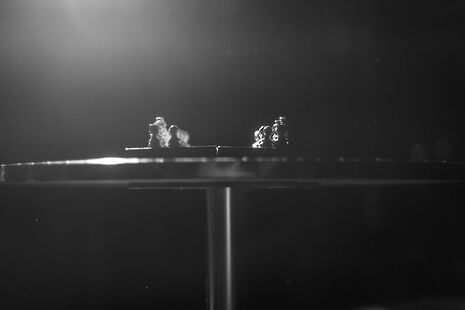The Seventh Seal review: ‘parodying the parodies’
This clever interpretation of Bergman’s film showcases strong acting but is not without creative shortcomings

A white-faced man, his features skeletal under its black cowl, sits opposite a knight. Between them is a chess board and behind them tosses a grey sea.
This image from Ingmar Bergman’s 1957 film, The Seventh Seal, has come to haunt our cinematic culture. Its brilliant sparseness lies in its power to encapsulate so much of what Bergman sets out to discuss – life, death, and the restless state of living with death – all within a moment of startling depth and absurdity. If there’s one thing Death isn’t mean to do, it's casually agree to a board game. If our knight can win the game, Death will set him free. But, as Death warns us, he is “a pretty skilled chess player”.
Aron Penczu’s vision of plague-ravaged medieval Scandinavia diverges from Bergman’s right from the beginning. Mannequins, often missing the odd limb, litter the stage but we are nonetheless greeted by that familiar shout of, “bring out your dead, bring out your dead!”. While Bergman’s version of history is certainly anachronistic and undoubtedly satirical, this is something different. Its anachronism is sharper - its homages to Monty Python (which in itself parodies The Seventh Seal) are matched with bicycles for horses and ukuleles for lutes. In many respects, this is a The Seventh Seal that examines the impact the film has had on popular culture, parodying the parodies of Bergman’s work and pushing its whimsical elements to the extreme.
It’s a shame, then, to see this production struggling. Although it begins to flow better as the plot gets going, the opening retains a disappointingly bitty quality. Short scenes which end on abruptly poignant lines make up most of the first half, and are only made more noticeable by untidy scene transitions. These invariably involve complete black outs and feel uncomfortably quiet, despite the effective use of sound by Caspar Bingham to signal Death’s arrival with an eerie violin melody, and the lilting songs of Jof (an amiable Benedict Mulcare), which perhaps might have been put to good use during these silences.
In fact, the whole cast is remarkably strong. Hannah Lyall in the central role as the Knight is an especially interesting casting choice, and one which really pays off. Her performance’s ponderous quality and soft-spoken nihilism develop nicely, and work well as a foil for the almost mad comedy of Archie Williams as Skat (a particular highlight of the opening night was William’s improvised, “for God's sake, Russell!”, as an audience volunteer upset some props). Special credit should also go to Jamie Sayers for his nuanced approach to Plog’s aggressive masculinity, and to Linnea Lagerqvist as Mia, managing to coax real warmth and humanity (ironically enough) from her interactions with the doll representing her infant son.
But unfortunately, too often the design elements simply do not support the actors. For one thing, this production was without a set designer, and suffice to say, the absence is felt, leaving a few crates and some relatively unimaginative projections to set the scene. Costume designer, Lorena Paton, is able to create a visually stunning moment towards the close of the show, representing flames through a sequence of whirling fabric, but ultimately the costuming of Death is a persistent problem. Bergman’s Death is grim-faced, and clad all in black (as many other fictional villains – Voldemort is always the one that pops into my mind – have been after him), and is rendered curiously human but alien, grinning while baring his teeth, comic yet deeply menacing. By contrast, this Death (Paul Clarke) had more of the air of an over-sized Casper the Friendly Ghost air about him, almost stumbling under a huge white sheet, and consequently loses Bergman's subtlety. This Death deserves the chuckles he received on his first entry, but is unable to convey any kind of menace and so falls flat - by the end neither funny not frightening.
In all honesty, there are certainly elements worthy of praise here, but I can’t say I’ll be recommending it over Bergman's version anytime soon. At the end of the day, Penczu’s vision is undoubtedly carefully crafted and is stylishly brought to life in the show’s preview – I only wish I could say the same for the show itself.
The Seventh Seal is on at the ADC Theatre until 10 February
 News / Uni Scout and Guide Club affirms trans inclusion 12 December 2025
News / Uni Scout and Guide Club affirms trans inclusion 12 December 2025 News / Cambridge study finds students learn better with notes than AI13 December 2025
News / Cambridge study finds students learn better with notes than AI13 December 2025 News / Cambridge Vet School gets lifeline year to stay accredited28 November 2025
News / Cambridge Vet School gets lifeline year to stay accredited28 November 2025 Science / Did your ex trip on King’s Parade? The science behind the ‘ick’12 December 2025
Science / Did your ex trip on King’s Parade? The science behind the ‘ick’12 December 2025 News / Pembroke to convert listed office building into accom9 December 2025
News / Pembroke to convert listed office building into accom9 December 2025








